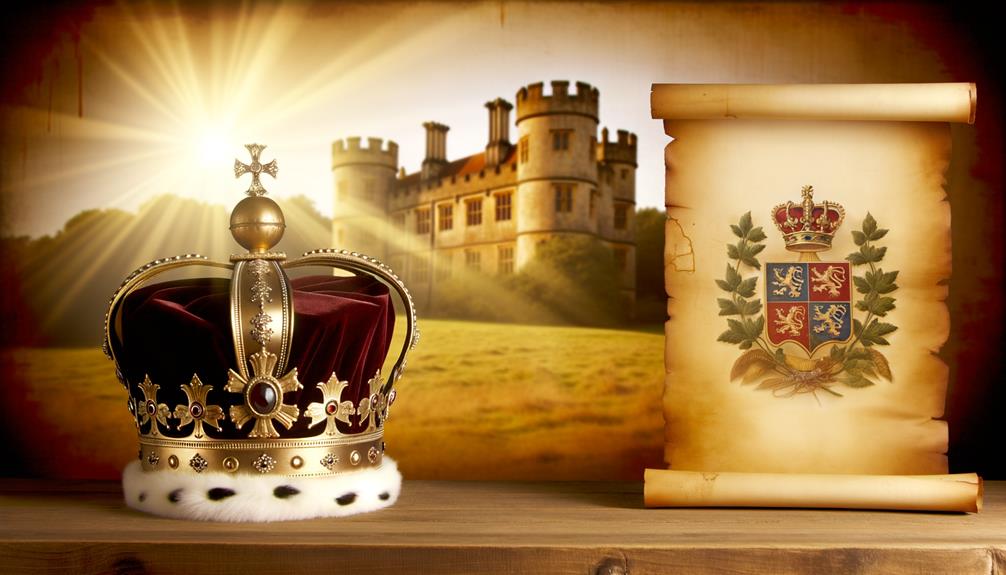Henry Name Meaning in English
The name Henry derives from the Old Germanic 'Heimirich,' meaning 'ruler of the household.' This name evolved through Old French as 'Henri' before becoming 'Henry' in Middle English. It symbolizes leadership and household governance.
Its historical significance is underscored by its association with numerous European monarchs, including Henry VIII of England and Henry IV of France. The name's medieval popularity among European nobility reflects its cultural transmission and alignment with virtues such as power and nobility.
Modern-day usage remains robust, merging tradition with contemporary appeal. To explore the various facets that make Henry enduringly popular, consider its historical and cultural impacts.

Key Takeaways
- Henry means 'ruler of the household,' derived from Old Germanic 'Heimirich.'
- The name evolved from 'Henri' in Old French to 'Henry' in Middle English.
- It has historical ties to European nobility and royal lineages.
- Henry signifies leadership, power, and chivalric virtues.
- It remains popular due to its historical resonance and modern elegance.
Etymology of Henry
Tracing the etymology of the name Henry reveals its origins in the Old Germanic name 'Heimirich,' which translates to 'ruler of the household.'
The term 'Heimirich' is a compound of two elements: 'heim,' meaning home or household, and 'ric,' meaning ruler or king. This combination underscores a sense of authority and governance within a domestic or familial context.
Over time, 'Heimirich' evolved linguistically through Old French as 'Henri' before becoming 'Henry' in Middle English. The evolution reflects both phonetic and cultural shifts as the name was adopted by various European societies.
Understanding this etymology provides a foundational comprehension of the name's linguistic journey, illustrating its transformation and enduring significance in different cultural lexicons.
Historical Significance
The name Henry holds substantial historical significance, primarily attributed to its royal lineage influence, which has perpetuated its status across centuries.
Its surge in popularity during the medieval era further underscored its widespread acceptance and reverence, particularly among European nobility.
Historical figures named Henry, such as Henry VIII of England, have indelibly shaped political and cultural landscapes, cementing the name's enduring legacy.
Royal Lineage Influence
Throughout history, the name Henry has been inextricably linked to numerous royal figures, most notably within the English and French monarchies, thereby cementing its significance in the annals of European nobility.
Especially, eight English kings bore the name Henry, from Henry I, who ascended the throne in 1100, to Henry VIII, whose reign in the 16th century profoundly altered the religious and political landscape of England.
Similarly, in France, King Henry IV is remembered for his pivotal role in ending the French Wars of Religion and initiating the Bourbon dynasty. This enduring association with royalty underscores the name Henry's deep-rooted prestige and influence, reflecting a legacy of leadership, reform, and historical prominence in European aristocracy.
Medieval Popularity Surge
During the medieval period, the name Henry witnessed a remarkable surge in popularity, driven by both its royal associations and its embodiment of chivalric ideals. This era saw a distinct alignment of the name with power, virtue, and nobility.
The name's prominence can be attributed to several key factors:
- Royal Endorsement: The name was borne by numerous monarchs, instilling a sense of prestige and authority.
- Chivalric Tradition: Henry became synonymous with the knightly virtues of honor, bravery, and loyalty, resonating with the societal values of the time.
- Cultural Transmission: The name's use in literature and legal documents solidified its standing in both noble and common classes.
This confluence of elements ensured its widespread adoption and enduring legacy.
Historical Figures Named Henry
Renowned for their impactful contributions to history, individuals named Henry have shaped political, cultural, and social landscapes across various eras and regions.
Henry VIII of England, a pivotal figure in the 16th century, influenced the religious and political fabric of his nation through the English Reformation to a great extent.
Similarly, Henry IV of France, known for his role in the Edict of Nantes, laid the foundation for religious tolerance.
Henry Ford revolutionized the automotive industry in the early 20th century, introducing assembly line production techniques that transformed manufacturing processes globally.
Each of these Henrys exemplifies the profound impact individuals bearing this name have had, underscoring its historical significance and enduring legacy.
Royal Connections
The name Henry carries significant royal connections, epitomized by historical figures such as Henry VIII of England, whose reign profoundly influenced the course of British history.
Numerous monarchs named Henry have left indelible marks on their respective domains, shaping governance, culture, and societal structures.
Today, the enduring legacy of these royal Henrys continues to influence contemporary perceptions of the name, underscoring its lasting regal association.
Historical Royal Figures
Henry, a name steeped in regal history, has been borne by numerous monarchs and nobility across various European dynasties, symbolizing power and legacy. The name's prominence in royal circles can be attributed to its association with influential rulers and statesmen who have shaped history.
Evidently, the name Henry has been linked to:
- Strategic Marriages: Henrys often engaged in alliances through matrimonial arrangements, strengthening political ties.
- Military Campaigns: Many Henrys led significant military expeditions, influencing territorial boundaries and national histories.
- Legislative Innovations: Several bearers of the name implemented reforms that altered the governance structures of their domains.
This historical context underscores the enduring legacy of the name Henry within the corridors of power, highlighting its significance in European dynastic politics.
Famous Henry Monarchs
Among the numerous illustrious bearers of the name, several Henrys stand out as monarchs whose reigns were marked by pivotal contributions to their nations' histories and legacies.
Henry II of England, for instance, established the Angevin Empire and played a vital role in the development of English common law.
Henry IV's ascension after the turbulent Wars of the Roses signified the beginning of the Tudor dynasty's consolidation of power.
Significantly, Henry VIII's reign profoundly altered the religious landscape of England through the establishment of the Church of England, severing ties with the Roman Catholic Church.
These monarchs, among others, reflect the enduring influence and historical significance associated with the name Henry within the annals of royal lineage.
Royal Influence Today
Contemporary royal connections to the name Henry continue to underscore its enduring legacy, as evidenced by its prevalence among modern European aristocracy and its symbolic representation of continuity and tradition within royal families.
The name's sustained significance is illustrated by its adoption among contemporary royals, who often choose it to honor historical legacies and reinforce dynastic continuity. Notable examples include:
- Prince Henry of Wales (commonly known as Prince Harry): His choice signifies a connection to the historical prestige of the name.
- Henrik, Prince Consort of Denmark: Reflects a blend of tradition and modernity in royal titles.
- Count Henri of Paris: Represents the name's persistent relevance in French royalty.
These instances exemplify the name's enduring prominence in contemporary royal contexts.
Cultural Impact
Given its widespread use across various cultures and historical periods, the name Henry has greatly influenced societal norms, literature, and political landscapes.
In literature, Henry has been immortalized by Shakespeare in 'Henry V,' portraying an idealized monarch who embodies leadership and valor.
Historically, figures like Henry VIII of England have left indelible marks on religious and political structures.
The name's recurring presence in political spheres, such as Henry Kissinger's impact on U.S. foreign policy, underscores its association with authority and intellect.
Culturally, the name evokes a sense of stability and tradition, often linked to notions of governance and ethical leadership.
Consequently, the name Henry continues to resonate deeply within various societal frameworks, reinforcing its enduring legacy.
Modern-Day Popularity
Building on its historical and cultural significance, the name Henry continues to maintain robust popularity in modern times, reflecting its enduring appeal across diverse demographics. This sustained relevance can be attributed to several key factors.
- Historical Resonance: The name evokes a sense of tradition and stability, appealing to those who value historical continuity.
- Versatility: Easily adaptable across various cultures and languages, Henry's phonetic simplicity guarantees its global usability.
- Modern Elegance: Despite its ancient roots, the name's timeless elegance aligns well with contemporary naming trends, making it a common choice among new parents.
Analytical examination reveals that these elements collectively contribute to Henry's persistent popularity, solidifying its status as a name that bridges the past and present.
Famous Henrys
Among the myriad individuals who have borne the name Henry, several have achieved significant prominence, leaving an indelible mark on history and culture.
Henry VIII of England, perhaps the most famous, is known for his role in the English Reformation and his six marriages.
In literature, Henry James, an American-British author, profoundly influenced narrative fiction with works such as 'The Portrait of a Lady.'
Science, too, has its luminaries, such as Henry Cavendish, an 18th-century scientist who discovered hydrogen.
Additionally, in modern times, Henry Kissinger, a pivotal figure in U.S. foreign policy, remains a significant name in political science.
These individuals exemplify the diverse fields in which bearers of the name Henry have excelled.
Variations and Nicknames
While the name Henry has been borne by many notable individuals throughout history, its variations and nicknames also reveal a rich tapestry of linguistic and cultural adaptations. The name Henry, originally derived from the Germanic name 'Heinrich,' has evolved across different languages and regions.
Common variations include:
- Henri: The French form, often associated with French royalty and nobility.
- Enrique: The Spanish and Portuguese adaptation, reflecting Iberian influences.
- Heinrich: The original German form, still prevalent in German-speaking countries.
Nicknames for Henry often reflect a more intimate or familiar usage, such as 'Harry' or 'Hal.' These diminutives provide insight into how names adapt within personal and cultural contexts, emphasizing the enduring legacy and flexibility of the name Henry.
Conclusion
The name Henry, deeply entrenched in history and culture, symbolizes nobility and power. Its etymological roots trace back to Germanic origins, reflecting strength and leadership.
The name's historical and royal connections have cemented its prestige across centuries. Its cultural impact is profound, seen in literature, politics, and beyond.
Modern-day popularity and notable bearers of the name continue to underscore its timeless appeal. Like a resilient oak, the name Henry endures, symbolizing steadfast strength and enduring legacy.






